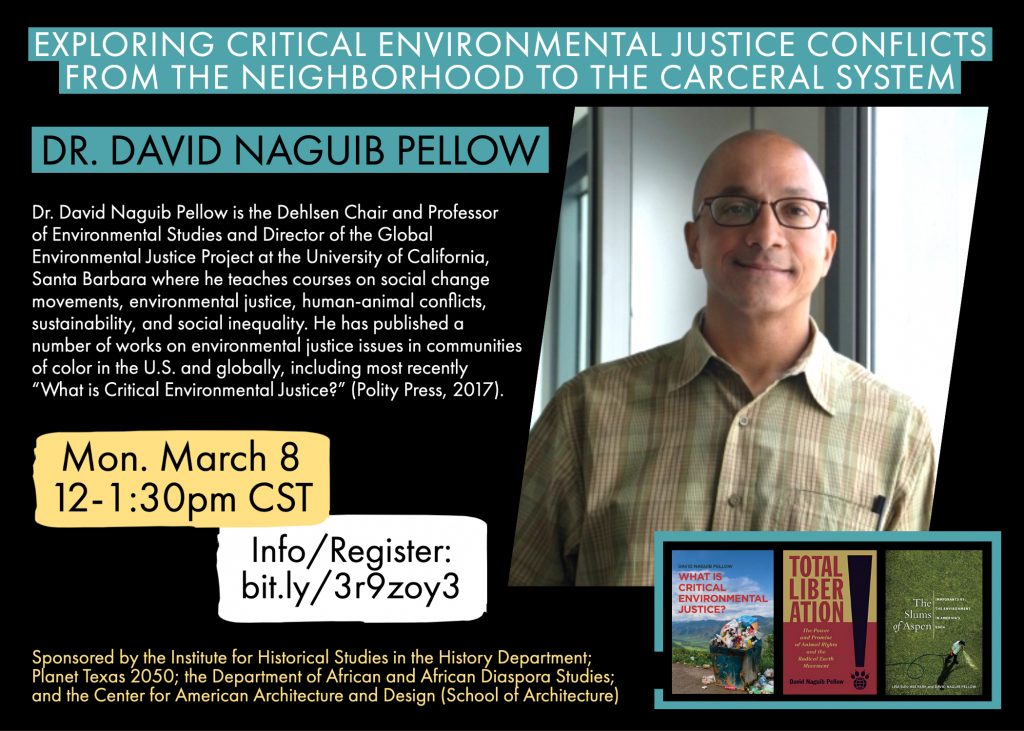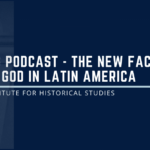Institute for Historical Studies, Monday March 8, 2021
This presentation considers the evolution of environmental justice studies as a field concerned primarily with the intersection of social inequalities and ecological risks. Drawing on the concept of “critical environmental justice studies,” I present cases from research on struggles for environmental justice in prisons and jails across multiple scales, including the body, communities, populations, and nations. I draw on evidence from historical and contemporary cases to illustrate the importance of understanding how multiple categories of difference (race, gender, class, sexuality, ability, species) are entangled in both the production of environmental inequalities and in the possibilities for realizing imaginative forms of environmental and climate justice.
Dr. David Naguib Pellow is the Dehlsen Chair and Professor of Environmental Studies and Director of the Global Environmental Justice Project at the University of California, Santa Barbara where he teaches courses on social change movements, environmental justice, human-animal conflicts, sustainability, and social inequality. He has published a number of works on environmental justice issues in communities of color in the U.S. and globally. His books include: What is Critical Environmental Justice? (Polity Press, 2017); Keywords for Environmental Studies (editor, with Joni Adamson and William Gleason, New York University Press, 2016); Total Liberation: The Power and Promise of Animal Rights and the Radical Earth Movement (University of Minnesota Press, 2014); The Slums of Aspen: Immigrants vs. the Environment in America’s Eden (with Lisa Sun-Hee Park, New York University Press, 2011); The Treadmill of Production: Injustice and Unsustainability in the Global Economy (with Kenneth Gould and Allan Schnaiberg, Paradigm Press, 2008); Resisting Global Toxics: Transnational Movements for Environmental Justice (MIT Press, 2007); The Silicon Valley of Dreams: Environmental Injustice, Immigrant Workers, and the High-Tech Global Economy (with Lisa Sun-Hee Park, New York University Press, 2002); Garbage Wars: The Struggle for Environmental Justice in Chicago (MIT Press, 2002); Urban Recycling and the Search for Sustainable Community Development (with Adam Weinberg and Allan Schnaiberg, Princeton University Press, 2000); Power, Justice, and the Environment: A Critical Appraisal of the Environmental Justice Movement (editor, with Robert J. Brulle, MIT Press, 2005); and Challenging the Chip: Labor Rights and Environmental Justice in the Global Electronics Industry (co-editor, with Ted Smith, David Sonnenfeld, and Leslie Byster, Temple University Press, 2006). He has consulted for and served on the Boards of Directors of several community-based, national, and international organizations that are dedicated to improving the living and working environments for people of color, immigrants, Indigenous peoples, and working class communities, including the Central Coast Climate Justice Network, Community Environmental Council, Global Action Research Center, the Center for Urban Transformation, Greenpeace USA, International Rivers, Community Environmental Council, the Fund for Santa Barbara, the Prison Ecology Project. He earned his B.A. in Sociology and Religious Studies at the University of Tennessee, Knoxville in 1992. He earned his M.A. and Ph.D. in Sociology from Northwestern University in 1998. Read is most recent essay publication “Environmental Justice in the time of COVID-19” in Bifrost, and learn more about his work at https://www.es.ucsb.edu/david-n-pellow.
This talk is part of the Institute’s theme in 2020-2021 on “Climate in Context: Historical Precedents and the Unprecedented.”
Sponsored by: Institute for Historical Studies in the History Department; Planet Texas 2050; Department of African and African Diaspora Studies; the Center for American Architecture and Design (Architecture)
The views and opinions expressed in this article or video are those of the individual author(s) or presenter(s) and do not necessarily reflect the policy or views of the editors at Not Even Past, the UT Department of History, the University of Texas at Austin, or the UT System Board of Regents. Not Even Past is an online public history magazine rather than a peer-reviewed academic journal. While we make efforts to ensure that factual information in articles was obtained from reliable sources, Not Even Past is not responsible for any errors or omissions.




